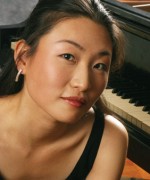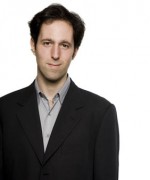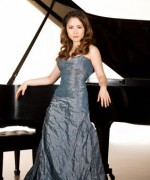Title
When the Van Cliburn Competition got underway in Fort Worth, Tex., in May, 10 of the 29 competitors were either current or former students at Juilliard. After three rounds, two out of six finalists had Juilliard affiliations. In the end, however, two silver trophy cups were handed to a pair of newcomers on the American piano scene: China’s Haochen Zhang and Japan’s Nobuyuki Tsujii.
Body
The two first prizes stirred up heated debate on the competition’s official blog: “I know he’s great, but was he really the best?” one commenter asked of Tsujii. Another wondered: “Are they both really ready to be ambassadors for piano?” Music critics watching the competition—either in person or via Webcast—soon joined the fray. “Nothing in recent memory has been as shocking as this year’s top prizes,” wrote a critic in The Wall Street Journal. Scott Cantrell, The Dallas Morning News classical music critic, had an even tougher assessment: “If all the contestants had performed behind a scrim, if no one had known anything about them, if they had been judged purely on musical values, I honestly believe some other pianists would have advanced ahead of Tsujii.”
The controversial winner, a 20-year-old Japanese pianist who has been blind since birth, was a fan favorite, with his enthralling performance of Rachmaninoff’s Piano Concerto No. 2 in the finals. But despite roars of approval from the audience, skeptics felt the judges were too swayed by Tsujii’s inspiring personal story and that he is too inexperienced for stardom.
“This was not a sympathy vote,” explained Yoheved Kaplinsky, chair of the piano department at Juilliard and a juror at the quadrennial event. “It was a real honest assessment on the part of the voters of how he played. We don’t look at someone who overcame odds. This is not the way we judge.” Kaplinsky commended Tsujii’s “honest musicianship, unshakable rhythm, and beautiful phrasing” and, emphasizing that his disability was not a factor, pointed out that another blind pianist was eliminated from the first screening round.
In the finals, Tsujii beat out two Juilliard contenders: Di Wu and Ran Dank, both of whom received master’s degrees and Artist Diplomas in piano from the School.
Of course, debate about piano competitions has been around as long as the modern competition itself. Bartok once said that competitions are for horses, not artists. Many detractors believe that events like the Cliburn reward “consensus players,” the cookie-cutter performers who offend the least number of jury members.
What’s more, the top three prizewinners at the Cliburn—who each earn $20,000 in cash, career management for three concert seasons, and a recording contract on the Harmonia Mundi USA label—have seldom won fame and fortune. However, for better or worse, few deny the competition’s enormous visibility.
“The Cliburn has more power to give you a sustainable career than other competitions,” said Spencer Myer, who received a master’s in piano at Juilliard in 2002, has taken part in more than 25 competitions, and won prizes at several. “The media attention has a lot to do with it. There’s the local and international press conference, the in-housing filming, and the Webcast. Also, the Van Cliburn name carries a lot more sway.”
“It’s about the publicity,” said Wu. “It has the biggest publicity machine in the world. Everyone’s watching online. You had the Associated Press coming in the other day. I remember the first time I was there, I tried out the piano and Fox News was backstage and they interviewed me. Before I knew it I was on TV. It was like ‘whoa!’ You just have to be able to stand the stress.”
The Van Cliburn Competition was founded in 1962 by the Louisiana-born, Juilliard-trained pianist who, in the tensest days of the Cold War, carried off the gold medal at the 1958 International Tchaikovsky Competition in Moscow. While Cliburn enjoyed a major career as a result of winning the Tchaikovsky, fewer pianists in the modern era have used competition victories as similar springboards. Indeed, several of this year’s competitors said the Cliburn competition, with its enormous repertoire requirements, is best approached as a way to achieve personal goals.
Soyeon Lee, who attended Juilliard for her bachelor’s, master’s, and Artist Diploma in piano, already has professional management, two commercial recordings, and an active touring schedule. Having made it as far as the preliminary round this year, she didn’t consider winning a make-or-break proposition. “Even though I didn’t advance, I had a really, really great time,” she said. “Every time you prepare for these things you learn so much about yourself because the repertoire requirements are so big and there’s a lot more pressure at the Cliburn because so many people are watching [the Webcast].”
While Lee received a handful of concerts as a result of her 2005 appearance at the Cliburn, she is pragmatic about a competition’s long-term impact. “A lot of the winners haven’t had lasting careers in these top piano competitions,” she said. “I don’t know if it’s because these are middle-of-the-road players who play it safe, or because of the nature of the business and how piano recitals are perceived in general has changed so much. I guess it’s a little bit of both.”
Myer, who competed in the preliminary round, sees competitions as a way to hone his practicing skills and master a lot of repertoire quickly, but he too acknowledges their limits. “It’s just a fact of nature that when you have 12 jury members, they’ll have to agree on whoever has the fewest quirks,” he said. “The tendency is to be safe, but I’ve gotten out of that because I’ve done so many competitions. I approach it like another recital.”
This year’s Cliburn, in three rounds, included solo recitals, piano quintet performances with the Takacs Quartet, and piano concertos performed with the Fort Worth Symphony Orchestra, led by James Conlon. The pianists already passed through a substantial screening process: written applications were received from 225 pianists worldwide. The applications were then whittled down to 151 pianists who tried out in screening auditions at six locations in China, Europe, and the United States. After arriving in Fort Worth, the 29 competitors manually drew for their performance order at an event at a downtown hotel. The drawing is notoriously stressful: an early draw, and you set the bar for the entire field. A late draw means you must stay focused for up to a week before your first recital while also preparing for the next rounds. “There’s a lot of tension in that room,” said Lee.
The backstage atmosphere isn’t all anxious and cutthroat, however. Several Juilliard pianists reported a spirit of camaraderie, with dinners and shopping trips together during downtime.
Kaplinsky said this year’s strong Juilliard showing “simply means that we have good students and we train them all.” She dismissed the perception that her students or former students enjoy an unfair advantage, particularly in Wu’s case. “In fact, it probably worked against her because we couldn’t vote for her,” she said, citing the rules preventing teachers from voting for their pupils. “If we could have voted for her, objectively speaking, she would have gone further.”
Wu has already received several concert engagements as a result of the Cliburn, including a date with the Philadelphia Orchestra this month and a recent appearance with the Fort Worth Symphony. She takes a realistic view of the whole experience. “Just because you didn’t win the medal doesn’t mean you’re not a good musician,” she said. “It just happens that they don’t like your style. That’s why it’s important when you go into a competition you set a goal for yourself and realize that the only thing you’re responsible for is the time you have on stage, and nothing else.”







